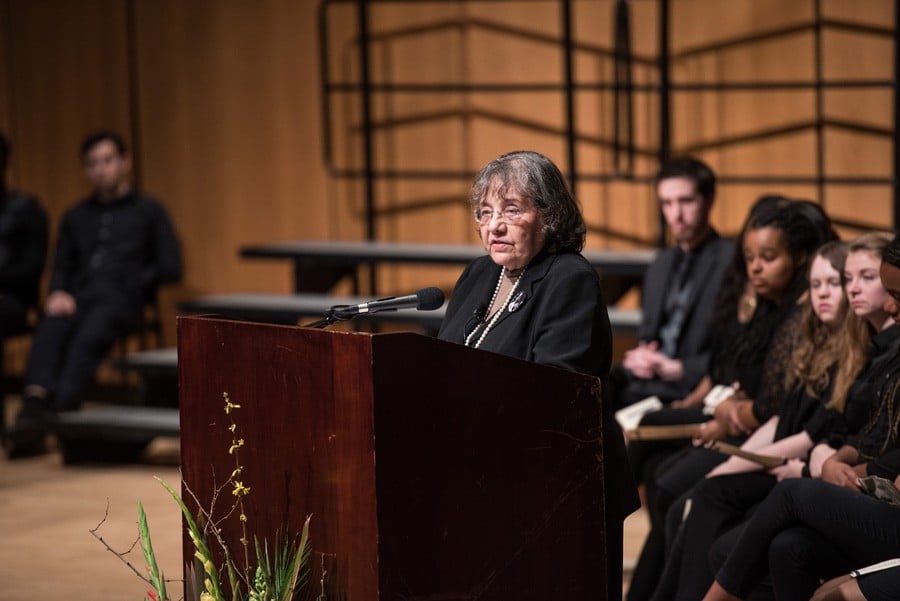Civil rights leader Diane Nash encourages nonviolent student activism
Leeks Lim/The Daily Northwestern
Civil rights activist Diane Nash addresses students about the importance of love and empathy. The former Freedom Rider and co-founder of the Student Nonviolent Coordinating Committee spoke to over 100 people at Pick-Staiger Concert Hall on Monday.
January 26, 2016
More than 50 years after coordinating a historic Freedom Riders busing protest, Diane Nash said brotherly love is the key to unifying people for social change.
The civil rights activist was the keynote speaker for Northwestern’s programming to commemorate the life of Martin Luther King, Jr. Speaking to an audience of more than 100 at Pick-Staiger Concert Hall, Nash stressed the importance of incorporating empathy into nonviolent activism efforts.
“People are never the enemy,” Nash said. “Unjust political systems, those are enemies. Attitudes, racism, sexism, ignorance … all of those are enemies. One of the problems with using violence to bring about social change is that you often kill individuals and leave the oppressive system — or the real problem — untouched.”
Nash was a prominent student activist in Nashville while attending Fisk University, and worked with King while she was in her 20s. She helped found the Student Nonviolent Coordinating Committee and was part of the Freedom Riders and Southern Christian Leadership Conference.
Discussing her experiences during the civil rights movement, Nash stressed empathy and using love for humankind to achieve justice. She also urged audience members to identify an objective, educate others, negotiate, demonstrate and resist oppression in order to achieve nonviolent change.
Medill senior Timothyna Duncan addressed the audience before Nash spoke and mentioned how she became hyperaware of her race when she came to the United States from Ghana. As Nash would later mention, she said action needed to be taken to improve race relations. Duncan said racial crimes, like the deaths of Michael Brown and Sandra Bland, must be addressed.
“(Fighting racism) means that we are committing ourselves to building a more fair and equitable society,” Duncan said. “It means that we are lending our voices to the poorest for justice and our actions to the march for change.”
Nash also stressed the role of students and others to stand up against injustices at the event, organized by the Evanston Campus MLK Commemoration Committee.
Video by Ryder Chasin/The Daily Northwestern, Editing by Bailey Williams/Daily Senior Staffer
Associated Student Government President Noah Star introduced Nash and said her comments about individual responsibility were especially relevant today.
“We, as individuals, have a responsibility to make sure that we are fighting for racial justice and fighting to make our campus more accessible,” Star told The Daily.
Nash also spoke at Thorne Auditorium on the Chicago campus at noon on Monday in an event funded by the Feinberg School of Medicine and the Pritzker School of Law.
In Evanston, the Northwestern University Jazz Small Ensemble, Alice Millar Chapel Choir and Northwestern Community Ensemble performed before the keynote speech.
Nash told memories of marching in the 1960s, often into opposing police forces, and how some protestors would get nervous. Others, she said, calmed them and reminded them of the people they were advocating for — not just themselves, but future generations.
“I want you to know that even though we had not yet met you, we loved you, and we were trying to bring about the best society we could for you,” Nash said, recalling what protestors would say to one another about the purpose of their protests. “Future generations are going to look to you to do the same for them.”
Email: [email protected]
Twitter: @ericasnoww


